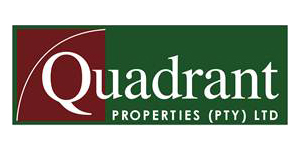Valuations
Boasting a team of valuers with more than 60 years expertise in the field, we offer an accurate account independent solution to your every valuation need.
The dynamic South African property market place and environment requires accurate, informed and timely information in order for asset managers and property owners to make correct decisions. With the huge number of variables affecting property, as well as the daily changes in fashionable locality, tenant profiles and hidden expense pitfalls, a professional who deals with these issues daily is a management necessity. The accurate determination of value at acquisition date is critical, as this is the point at which the potential of all returns and capital gain in future is determined.
Quadrant Properties offers the following valuation services:
- Open Market Value (including for an alternative use)
- Depreciated Replacement Value
- Open Market Rental Value
- Valuations for Estate Duty
- Valuations for Mortgage Finance
- Estimated Replacement Cost for Insurance
- Capital Gains Tax
- Forced Sale Value
- Expropriation Values
- Discounted Cash Flow Assessments
There are a large number of factors required to consider a valuation. The market forces, assessment of the property, the nature, location and other aspects will be considered by the valuer.
Certain information is required from the property owner in order to establish an accurate valuation. This is generally as follows and should be available to the valuer:
Market based valuations normally employ one or more of the valuation approaches by applying the principle of substitution, using market-derived data. This principle holds that a prudent person would not pay more for a good or service than the cost of acquiring an equally satisfactory substitute good or service, in the absence of the complicating factors of time, greater risk, or inconvenience. The lowest cost of the best alternative, whether a substitute or the original, tends to establish Market Value.
Market based valuation approaches include:
-
SALES COMPARISON APPROACH
- This comparative approach considers the sales of similar or substitute properties and related market data, and establishes a value estimate by processes involving comparison. In general, a property being value (a subject property) is compared with sales of similar properties that have been transacted in the market. Listings and offerings may also be considered.
-
INCOME CAPITALISATION APPROACH
- This comparative approach considers income and expense data relating to the property being valued and estimates value through a capitalization process. Capitalisation relates income (usually a net income figure) and a defined value type by converting an income amount into a value estimate. This process may consider direct relationships (known as capitalization rates), yield or discount rates (reflecting measures of return on investment), or both. In general, the principle of substitution holds that the income stream which produces the highest return commensurate with a given level of risk leads to the most probable value figure.
-
FACTORS AFFECTING CAPITALISATION APPROACH
-
TENANT
- Calibre of tenant, Length of Lease, Escalaton, Triple net structure of Lease, Tenant Mix, Options, Number of Tenants, Tenant Turnover, Rental market relationship.
-
LOCALITY
- Appreciating, Depreciating, Declining, Potential, Environment, Crime Perception, Address Perception.
-
BUILDING
- Age, Design, Aesthetics, Height, Environment, Internal Utility, Facilities, Surround, Parking, Roadways, Maintenance, Operating Costs Comparative to Market, Internal Condition, External Condition, Inherent Construction Problems, Security, Operating Costs, Expenditure High or Low compared to Market.
-
MARKET
- Demand for Locality, Demand for Building, Competition - Other Space Available at What Rates, New Development and Alternative Availability of Space, Rental Appreciation Potential, Rental Comparative - Higher or Lower than Market.
-
TENANT
-
GENERAL
- Shopper Patronage, History of Vacancy, Surrounding Demographics, Surrounding nature of Property, Management Costs, Vacancy Percentage for Area, Development of Area Upgrading/Downgrading.
-
DISCOUNTED CASH FLOW ANALYSIS (DCF)
- A financial modeling technique based on explicit assumptions regarding the prospective cash flow to a property or business. As an accepted methodology within the income approach to valuation, DCF analysis involves the projection of a series of periodic cash flows either to an operating property, a development property, or a business. To this projected cash flow series, an appropriate, market derived discount rate is applied to establish an indication of the present value of the income stream associated with the property or business. In the case of operating real properties, periodic cash flows is typically estimated as a gross income less vacancy and collection losses and less operating expenses/outgoings. The series of periodic net operating incomes, along with an estimate of the reversion/terminal value, anticipated sales income are estimated to arrive at a series of net cash flows that are then discounted over the projected development and marketing periods. In the case of a business, estimates of periodic cash flows and the value of the business at the end of the projection period are discounted. The most widely used applications of DCF analysis are the Internal Rate of Return (IRR) and Net Present Value (NPV).
-
COST APPROACH
- Full set of leases pertaining to the property
- Approved plans of any improvements
- Approximately a 2 year history of expenditure
- The title deed and correct erf number and property description
For Further Info click on this link or call us or email us on 011 530 9840 / peter@quadrantproperties.co.za




